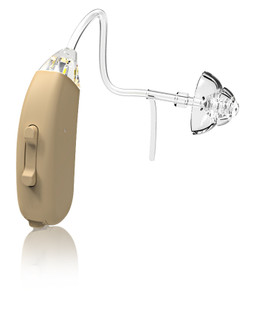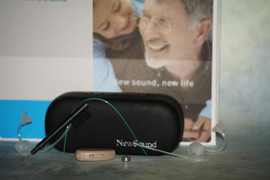Hear Better Than Ever Before The Latest Advances in Hearing Aid Technology
Posted by DR Paul on Jul 01, 2024
In today's fast-paced world, technology is advancing rapidly, and hearing aids are no exception. For people with hearing loss or those looking to buy a hearing aid, understanding the latest innovations can significantly impact their quality of life. This blog post explores the newest advancements in hearing aid technology, offering valuable insights and practical tips for making an informed decision.
The Evolution of Hearing Aids
From Analog to Digital
Hearing aids have come a long way from their analog beginnings. While earlier devices amplified all sounds equally, modern digital hearing aids offer more precise and customizable sound amplification. This shift from analog to digital has paved the way for numerous technological advancements.
The Role of Miniaturization
Smaller devices with more powerful technology have become the norm. Miniaturization allows hearing aids to be less noticeable and more comfortable while still delivering top-notch performance. This has made it easier for users to wear them discreetly.
Connectivity and Integration
Modern hearing aids now integrate seamlessly with other devices. From smartphones to TVs, the ability to connect wirelessly enhances the user experience, making it easier to manage and control hearing aids through various mediums.
Adaptive Sound Processing
Real-Time Environmental Adjustment
One of the most significant advances is adaptive sound processing. This technology allows hearing aids to automatically adjust to different environments in real-time. Whether you're in a noisy restaurant or a quiet library, adaptive sound processing ensures you hear clearly without manual adjustments.
Noise Reduction and Speech Enhancement
Noise reduction algorithms help filter out background noise, focusing on essential sounds like speech. This leads to better clarity and reduces listening effort, making conversations more enjoyable and less tiring.
Directional Microphones
Directional microphones are another crucial feature. They focus on sounds coming from a specific direction, such as the person you're talking to, while minimizing surrounding noise. This technology is particularly beneficial in noisy environments.
Rechargeable Hearing Aids
The Convenience of Rechargeable Batteries
Gone are the days of constantly changing tiny hearing aid batteries. Rechargeable hearing aids offer the convenience of simply placing your device in a charging dock overnight. This not only saves money in the long run but also reduces waste.
Longer Battery Life
Modern rechargeable hearing aids come with longer battery life, ensuring that users can go through their day without worrying about their devices running out of power. This reliability is crucial for maintaining an active lifestyle.
Environmentally Friendly
Rechargeable hearing aids are also more environmentally friendly. By reducing the need for disposable batteries, users contribute to less environmental waste, making it a more sustainable option.
Advanced Feedback Management
Eliminating Whistling and Feedback
Feedback, commonly experienced as whistling sounds, can be a significant annoyance for hearing aid users. Advanced feedback management systems use sophisticated algorithms to detect and eliminate these unwanted sounds, ensuring a clear and uninterrupted listening experience.
Improved Comfort
By eliminating feedback, users can enjoy a more comfortable experience. There's no need to worry about adjusting the device or experiencing sudden, unpleasant noises, making it easier to focus on what's important.
Enhanced Sound Quality
The combination of advanced feedback management and other modern technologies results in enhanced overall sound quality. Users can enjoy clearer and more natural sounds, improving their daily interactions and activities.
AI and Machine Learning
Personalized Hearing Solutions
Artificial intelligence (AI) and machine learning are revolutionizing hearing aids. These technologies enable devices to learn and adapt to the user's preferences and listening environments, providing a highly personalized hearing experience.
Predictive Adjustments
AI-powered hearing aids can make predictive adjustments based on the user's habits and routines. For example, if you frequently go to a noisy café, the device can automatically adjust to optimize sound quality in that specific environment.
Continuous Improvement
Machine learning allows hearing aids to continuously improve over time. The more you use them, the better they become at understanding your unique hearing needs, ensuring optimal performance.
Telehealth and Remote Adjustments
Virtual Appointments
Telehealth has become increasingly popular, and hearing aid technology is no exception. Users can now have virtual appointments with audiologists, receiving professional guidance and adjustments without needing to visit a clinic physically.
Remote Fine-Tuning
Remote fine-tuning allows users to have their hearing aids adjusted by professionals from the comfort of their homes. This convenient feature ensures that users always have access to the best possible sound quality.
Enhanced Accessibility
Telehealth and remote adjustments make hearing care more accessible, especially for those living in remote areas or with mobility issues. This inclusivity is a significant step forward in hearing healthcare.
Smart Hearing Aids
Integration with Smart Devices
Smart hearing aids can now integrate with various smart devices, offering users a seamless experience. From streaming music to receiving phone calls directly through the hearing aids, this connectivity enhances convenience and functionality.
Health Monitoring
Some advanced hearing aids come with built-in health monitoring features. They can track physical activity, detect falls, and even monitor heart rate, providing users with additional health benefits.
Voice Assistance
With integration to voice assistants like Siri or Google Assistant, users can control their hearing aids using voice commands. This hands-free operation adds an extra layer of convenience to daily life.
Improved Comfort and Fit
Custom-Made Earmolds
Custom-made earmolds ensure a perfect fit, enhancing comfort and reducing the chances of the hearing aids falling out. This personalization makes wearing hearing aids more pleasant and hassle-free.
Soft and Flexible Materials
The use of soft and flexible materials in modern hearing aids prevents irritation and discomfort. Users can wear their devices for extended periods without experiencing any discomfort.
Discreet Designs
Discreet designs make modern hearing aids less noticeable, boosting users' confidence. With a variety of styles and colors available, users can choose a design that suits their personal preferences.
Enhanced Durability
Water and Dust Resistance
Many modern hearing aids come with water and dust resistance, making them more durable and suitable for various environments. This added robustness ensures that the devices can withstand daily wear and tear.
Shock Absorption
Improved materials and construction techniques offer better shock absorption, protecting the delicate internal components from damage. This durability extends the lifespan of the hearing aids.
Long-Lasting Performance
With advancements in battery technology and overall construction, today's hearing aids are built to last. Users can rely on their devices for years, making it a worthwhile investment.
Tinnitus Management
Integrated Tinnitus Maskers
Many advanced hearing aids come with integrated tinnitus markers, providing relief for those who suffer from tinnitus. These maskers generate soothing sounds that help reduce the perception of tinnitus.
Customizable Sound Therapy
Customizable sound therapy options allow users to tailor the tinnitus masking sounds to their preferences. This personalized approach ensures maximum comfort and effectiveness.
Professional Support
Access to professional support for tinnitus management is often included with modern hearing aids. Audiologists can provide guidance and adjustments to optimize the tinnitus masking features.
Conclusion
The latest advances in hearing aid technology offer incredible benefits for people with hearing loss. From adaptive sound processing to AI-driven personalization, these innovations enhance the overall hearing experience, making daily life more enjoyable and fulfilling. If you're looking to explore these cutting-edge features, consider visiting hear-better.com for more information and expert guidance. Remember, the right hearing aid can significantly improve your quality of life, and there has never been a better time to invest in your hearing health.
For those interested in taking the next step, book a consultation with a hearing specialist today. They can help you find the perfect hearing aid tailored to your unique needs, ensuring you enjoy all the latest advancements in hearing technology.










